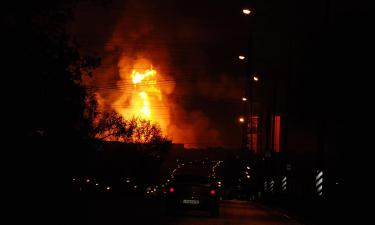Putin’s littoral policy reflects likely American failure in Iraq
In just 15 short months, George W. Bush, the most radical and unpopular President in American history, will step down and hand over power to a successor. He’ll stand on the podium in front of the Capital Building in Washington, tearfully wave good-bye to his countrymen, and then make his escape back to his comfortable ranch in Texas. Four out of five Americans will be glad to see him go. Unquestionably, that proportion will be even higher in most other countries. The good news is that after nearly eight years of bellicose rhetoric, arrogant unilateralism and clandestine domestic and foreign policies, the disastrous Bush Administration is finally drawing to a close.
It now seems likely that a great majority of Americans will vote to reverse course and try to re-establish more normal and traditional relations both at home and abroad. It would be naïve to assume that after Bush, America can just slide right back into her old job as world leader. The next US President will probably have to work very hard to repair America’s badly tarnished image in the world. The consequences of America’s misguided and illegal invasions of Iraq and Afghanistan must extend far beyond the horrific civilian casualties. But Putin’s historic visit to Iran last week was still a rather rude awakening.
The very image of Vladimir Putin and Mahmoud Ahmadinejad together on the same stage was extremely disconcerting. In my eyes, Ahmadinejad is the very face of evil in the modern world, the incarnation of that medieval psychopathology known today as religious fundamentalism, which, by the way, is by no means restricted to the Muslim world. A visit to America’s own “bible belt” will quickly convince anyone rational of the cosmopolitan nature of this ancient plague. I never saw much admirable about the Bolsheviks, except in their attitudes towards priests! Anyway, to see Putin smiling and shaking hands with the likes of Ahmadinejad was bad enough, but as an American, I found Putin’s words during his visit to Iran even more chilling.
Yes, I expected, and even agreed with his continued condemnation of Bush’s crazy ideas about missile defense in Europe. But it was Putin’s new littoral policy that I found most disturbing. This included explicit warnings to all foreign powers, especially the United States, to stay away from the oil-rich Caspian Sea, and indeed to keep out of all the former Soviet Republics in Asia, essentially drawing a red line around the region that included Iran. Again, this is not to say that I disagree with the sentiment or begrudge Russia’s right to do this. I am even grateful for the restraint that this policy should have on any last minute ideas of mad adventurism that might tempt Bush and his oil-craving cronies in the waning days of their power. But as Putin spoke, I realized with a shutter that Russia’s new policy was based on the assessment that the United States was on the verge of defeat in Iraq, desperate, and growing increasingly irrelevant in the world.
Now, these are opinions I largely share, and have patriotically expressed to my fellow Americans and anyone else who would listen. But to see these views actuate key Russian foreign policy was the embodiment of my worst fears. It means that even if we Americans can’t quite bring ourselves to admit that the war in Iraq is lost, such blindness can’t shield us from the consequences. The lesson, which America could have learned second-hand from Russia’s experience in Afghanistan, is that today’s modern weapons can easily destroy armies, even entire cities, but they can’t win hearts and minds, stop civil wars, build nations or even hold onto real estate for any length of time.
Its simply too expensive. So it may not be tomorrow, or next year, or even the year after that, but sooner or later, the United States, deeply in debt, humiliated, bitterly resented and without influence in the Arab world, will probably have to withdraw from Iraq. The ensuing chaos will leave Iran as the dominant power in the region. Russia’s new littoral policy simply recognizes this as the most likely outcome amid the growing carnage and increasing impotency of the United States to influence events in the region.
The implications and consequences of an American failure in Iraq extend far beyond the Middle East. The impact of the war has practically shattered NATO. Aside from a few noisy Poles and bitter Lithuanians, Russia’s influence in Europe has made great gains as a result. And of course, no one hears Putin complaining about record-high oil prices. However, the situation to the East is quite different. Like a political drunk-driver, the incompetence and shortsightedness of the Bush administration has fanned the flames of Muslim fundamentalism, encouraged the proliferation of nuclear weapons and fed the malignant growth of a thuggish China.
These are now serious problems for Russia, and it is in light of these challenges that Russian policy in the region must be understood. In other words, Putin may not prefer Ahmadinejad; Russia has had her own bitter experiences with Islamic fundamentalists. It’s just that thanks to the high likelihood of a catastrophic American failure in Iraq, the probably is that Russia is going to be stuck with Ahmadinejad, or someone rather like him, for the foreseeable future.
I still believe that in the big picture, Russia and America are natural allies. But by virtue of her vast human and natural resources, Russia sees herself as once again in ascendancy on the world stage. In contrast, Russia, and much of the world, perceives the United States as a declining power, an irresponsible paper tiger, on the verge of becoming just a regional player, largely bereft of influence outside the English-speaking world. I think that this is a key sticking point today in the relationship between Washington and Moscow, because the Americans obviously don’t share this view.
Despite the bleak situation in Iraq, they just can’t get their arms around the enormity of the failure or face the consequences. They still see themselves idyllically as the unblemished leader of the “free world”, the winner of the cold war, the benevolent, last, great hope of humanity. “The good guys who love Jesus!” The natural result has been misunderstanding and renewed competition. Given America’s dismal track record at “building democracy” over the last eight years, it’s perhaps not so surprising after all that such strange bed-fellows like Putin and Ahmadinejad should find common ground in wanting the United States out of the neighborhood. Perhaps with new leadership, imminent in both America and Russia, the historic reality of greater common interests will once again overshadow illusions and petty differences to infuse reason and cooperation back into the old alliance.
Dominick L. Auci, Ph.D.
Escondido, California
Subscribe to Pravda.Ru Telegram channel, Facebook, RSS!



